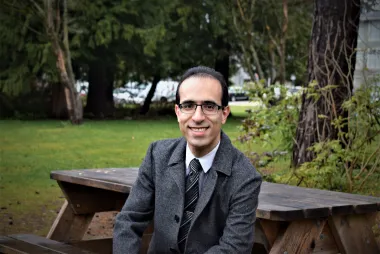“I have developed a version of these sensors for artificial skin application that is currently being developed towards making robots more human in their sense of touch, and also enabling amputees with prosthetics to regain the ability to feel.”

Mirza Saquib Sarwar
- Degree:
- Doctor of Philosophy
- Grad year: 2019
- Program:
- Campus: Vancouver
I am originally from Bangladesh, but having spent a third of my life here, Vancouver is just as much a home to me as Dhaka. I have a very tight family, consisting of my parents and my little sister, who are the real reason for any success that I have in life. My PhD research was on soft sensors that enable a system to detect: if a pressure is applied; if something is slipping or if there is human contact — all necessary traits for artificial skin applications for robots or prosthetics. I am now collaborating with a Japanese company to add touch sensing abilities to a humanoid robot. I am also working towards a startup to build robots that can automate manual labour intensive tasks that require a “soft touch” such as strawberry picking.
Why did you choose engineering?
I wanted a career that would equip me with the tools necessary to have a wide impact on mankind. I envisioned myself as something like a pharmacologist who finds a cure for cancer, or a policymaker who leads the implementation of an accord to redistribute the world’s resources, or even someone who could build a device that enables amputees to regain the ability to conduct dextrous manipulation of objects. However, being challenged in several necessary traits, including data retention, most of these options were out the window. But taking into account my interest in building things, engineering was a logical choice.
How are you applying the skills you learned through your studies at UBC?
My PhD research is on soft sensors that enable a system to detect if a pressure is being applied, something is slipping, or if there is a human contact, and more. I have developed a version of these sensors for artificial skin application that is currently being developed towards making robots more human in their sense of touch, and also enabling amputees with prosthetics to regain the ability to feel.
What has been your most valuable non-academic experience studying engineering at UBC?
My most valuable non-academic experience at UBC would include all my interactions with my supervisors (Dr. Madden and Dr. Mirabbasi) outside of work related meetings; through those non-academic interactions, I have learned the traits of a personable, compassionate and good human being.
What advice would you give a student considering a graduate degree in engineering?
Highly recommended! However it is just as important to select the right supervisor as it is to select the right project. If both of these are not aligned perfectly the degree can be a complete train wreck.
Where do you find your inspiration?
I would have to say most of my ideas are bio-inspired, so short answer — nature!


